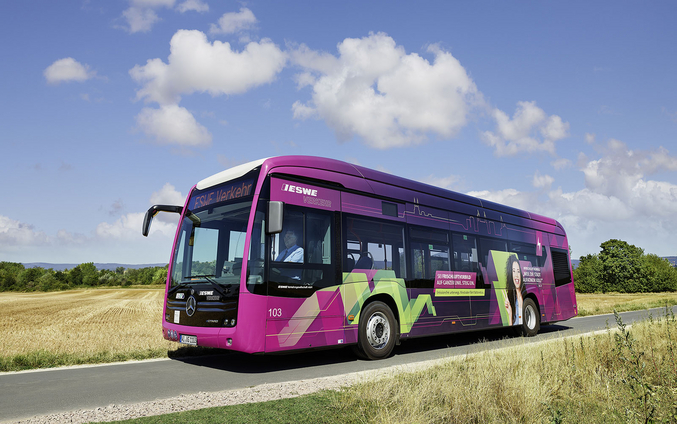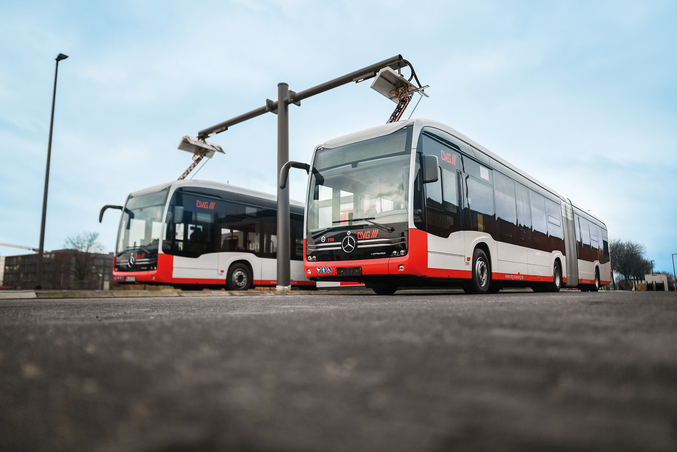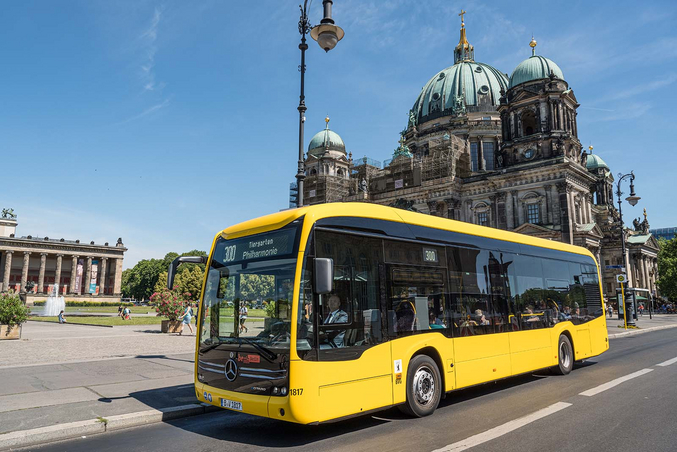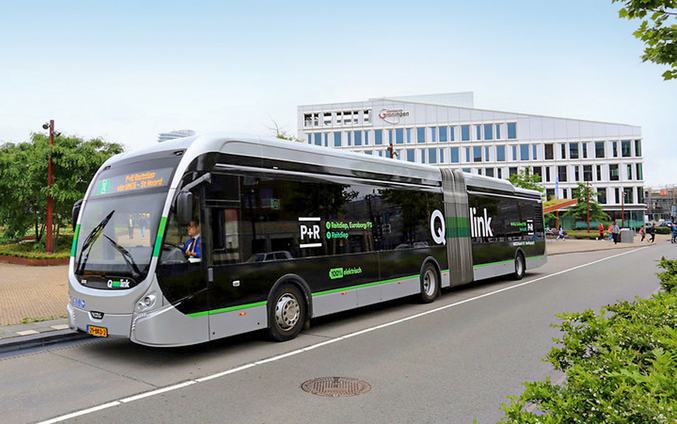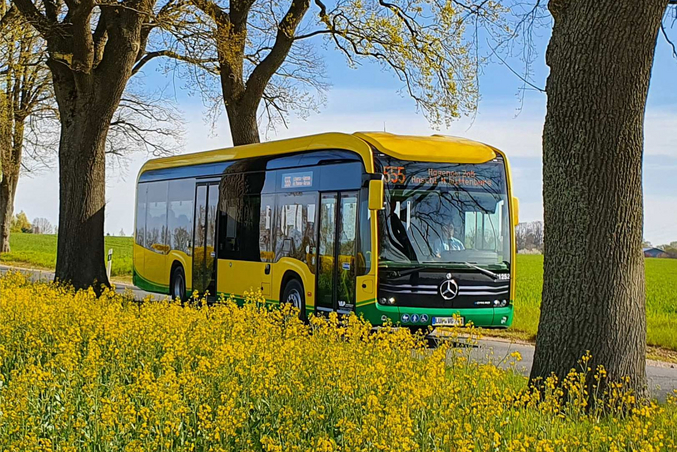Fleet and depotmanagement
The end-to-end solution for e-mobility
E-ready right from the off – The standard IVU system provides numerous functions for the efficient deployment of electric buses of all types right from the outset. Even in the standard configuration, extensive automation helps transport operators to optimise operational workflows and integrate electric buses seamlessly into planning, dispatch and fleet management.

Creating optimal timetables and vehicle working schedules
Efficient vehicle blocks and charging plans for battery-powered electric buses: IVU.suite supports overall vehicle working scheduling from daily deployment all the way to vehicle working schedules for several days including maintenance, service and charging times. At the same time, numerous automated functions and adaptive algorithms make workflows much faster.
The vehicle working scheduling of IVU.suite takes all relevant data into account, such as information about terrain and vehicle utilisation as well as charging station types and their power output. In addition, the system knows the power consumption of the various electric bus models as well as the age of their batteries, from which it determines a forecast of the expected range.
To ensure efficient vehicle working, the system takes steps such as minimising the number of deployed vehicles and the lengths of non-revenue trips. The optimisation also factors in charging processes automatically and takes into account factors such as the remaining range, recharge status and charging time required for the electric buses. The integrated variant planning function also allows transport operators to calculate various scenarios.
Key Features
-
Utilise information: Topography, infrastructure, consumption profiles – IVU.suite supports planning with important information.
-
Extensive charging planning: Whether depot charging or opportunity charging – charging stations can be taken into account and charging process automatically factored in during vehicle working scheduling.
-
Determine power consumption precisely: Weather, passenger numbers, battery age, auxiliary consumers – sophisticated battery and vehicle models enable detailed power consumption forecasts.
-
Powerful optimisation core: The optimiser’s sophisticated mathematical approach makes it possible to model the complexity of the discharging and charging of batteries in detail while optimising mixed fleets in an integrated way.
-
Take activities into account: Whether cleaning or preconditioning, any activities on the vehicle can be easily planned and entered in the vehicle working schedule.
-
Variant planning: The integrated variant planning function allows scenarios to be easily calculated for different seasons and operational situations.
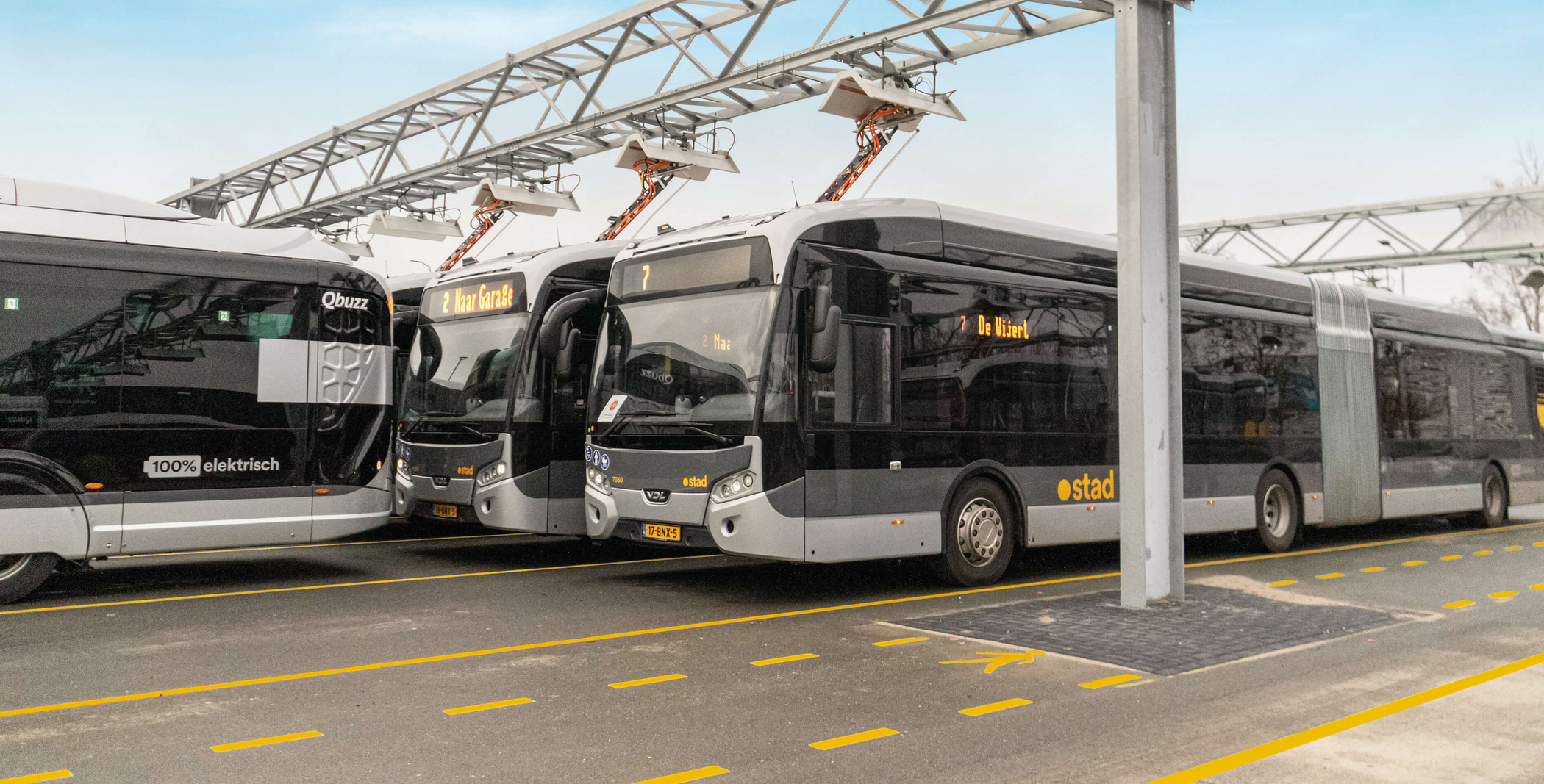
Load and charging management
Fully charged into the vehicle block – with IVU.suite, planners and dispatch managers have the overall charging process under control, from long-term charging planning through controlling the infrastructure and all the way to energy management at the depot. The software compiles all relevant data, calculates optimum charging scenarios and ensures that electric buses are always sufficiently charged, and the load limits of the infrastructure are adhered to.
Target recharge status and target charging time, battery age, total available output, charging stations that are ready for use and energy costs: Sophisticated algorithms take every aspect of charging planning into account and determine the correct charging strategy for every vehicle and every depot. In this way, charging processes drain only as much output as is actually required. Smart peak shifting avoids load peaks and capacity overloads on the one hand and distributes charging processes dynamically across vehicles and charging stations on the other in order to enable efficient and economical charging.
The charging point monitor shows an overview of all charging points and provides information about charging processes and power consumption. At the same time, the system warns the user in the event of deviations.
As a component of IVU.suite, load and charging management can be operated alone or integrated in the depot management system. As a result, the system can grow in modular fashion according to the growth of the fleet.
Key Features
-
Direct control and monitoring of the charging infrastructure: The direct line to the charging station – the charging management system creates the optimum charging plan for your vehicles and controls and monitors your charging infrastructure.
-
Model charging processes: The right output depending on the battery and charging station – detailed battery, charging point and infrastructure models enable precise charging plans and output requirements to be calculated.
-
Adhere to load limits: Load and charging management automatically takes the technical and situational output limits into account.
-
Flexible rule editor: Criteria and strategies for the target recharge status and target charging time can be specified in detail and easily entered in the system.
-
Preconditioning: The system takes the output requirements for preconditioning the passenger compartment into account and initiates it in good time.
-
Smart charging and energy management: Load shifting optimises the distribution of charging processes. Factors such as electricity procurement costs and network utilisation can also be incorporated.
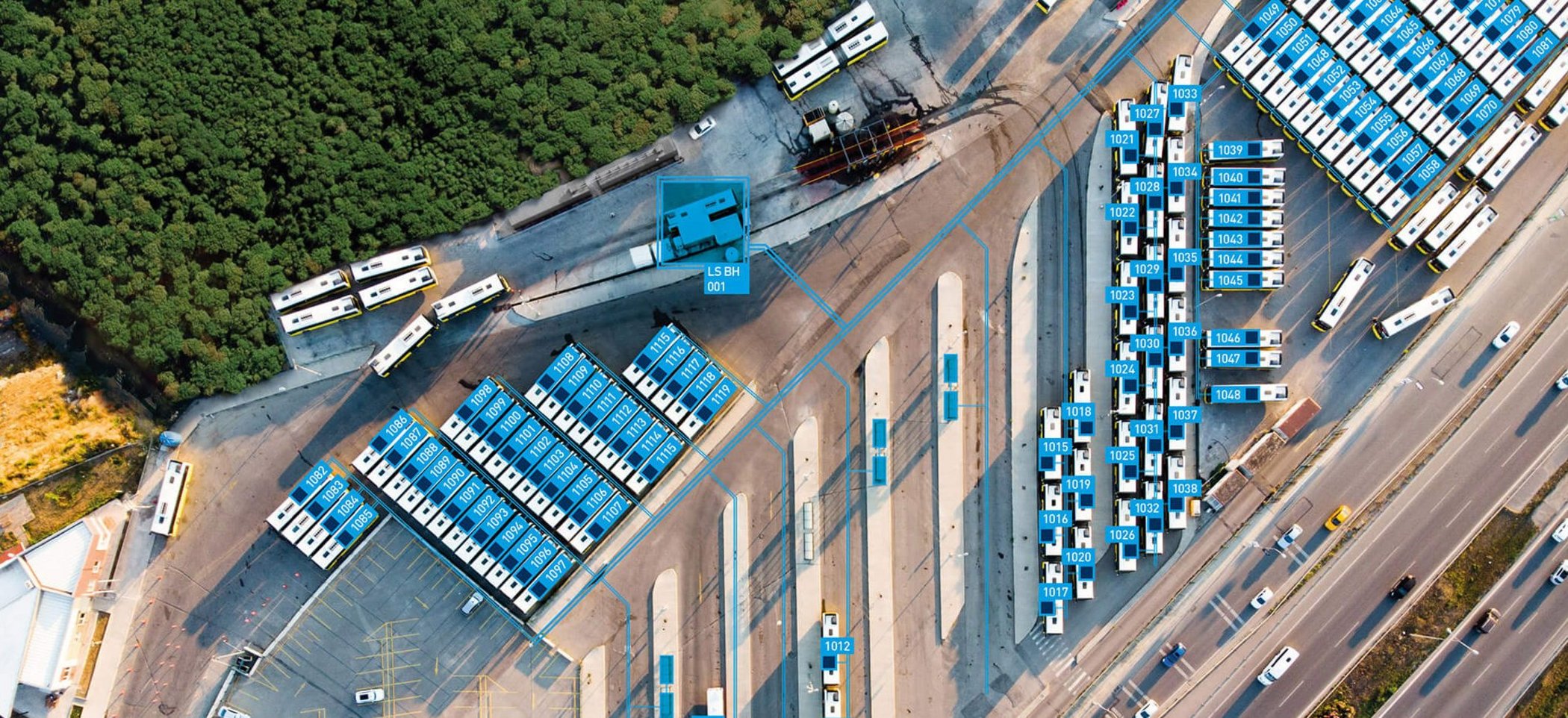
Automating processes at the depot
The depot management system (eDMS) of IVU.suite ensures that transport operators can smoothly park their electric buses, charge them for a specific range and deploy them again – regardless of the vehicle and in only one system. Whether it’s mixed operations or purely electric fleets, numerous automated functions accelerate workflows and make cooperation easier across all areas of responsibility.
Through automated processes, the depot management system of IVU.suite brings about increases in efficiency at the depot and automatically determines the optimum vehicle block, parking space and charging plan. Vehicle availability, vehicle types and services such as washing, cleaning and maintenance are all taken into consideration in the process. The direct connection between integrated load and charging management and the charging infrastructure ensures maximum efficiency and flexibility in dispatch.
The eDMS also digitalises the flow of information at the depot. In this way, drivers can see their target parking space on the on-board computer and via the display on the one hand and use the IVU.pad to find out where their vehicles are parked prior to departure on the other.
Vehicle and vehicle block status are continuously updated with actual data in the depot management system. Thanks to the tight integration with the control centre, the dispatch managers are always kept informed of a bus’s current run position.
Key Features
-
Automatic vehicle block and parking space allocation: Vehicle type, recharge status, next vehicle schedule – powerful algorithms automatically determine the optimum parking space, vehicle working schedule and charging plan, even in the event of changes at short notice.
-
Integrated load and charging management: The dynamic recalculation of charging plans and direct control of the charging infrastructure ensures efficiency and flexibility in dispatch.
-
Precise power consumption forecast: Sophisticated technical models predict the expected power consumption, also taking opportunity charging into consideration, and even learn as they go.
-
Automatic conflict warning: Whether it’s an incorrectly parked vehicle, delays or a low state of charge – the system issues notifications in the event of disruption thanks to comprehensive monitoring.
-
Digitalised flow of information: On-board computer and display inform drivers of their target parking space. The IVU.pad provides information on vehicles’ parking spaces.
-
Integration of actual data: Tight integration with the control centre means information on buses’ current run positions is continuously updated.
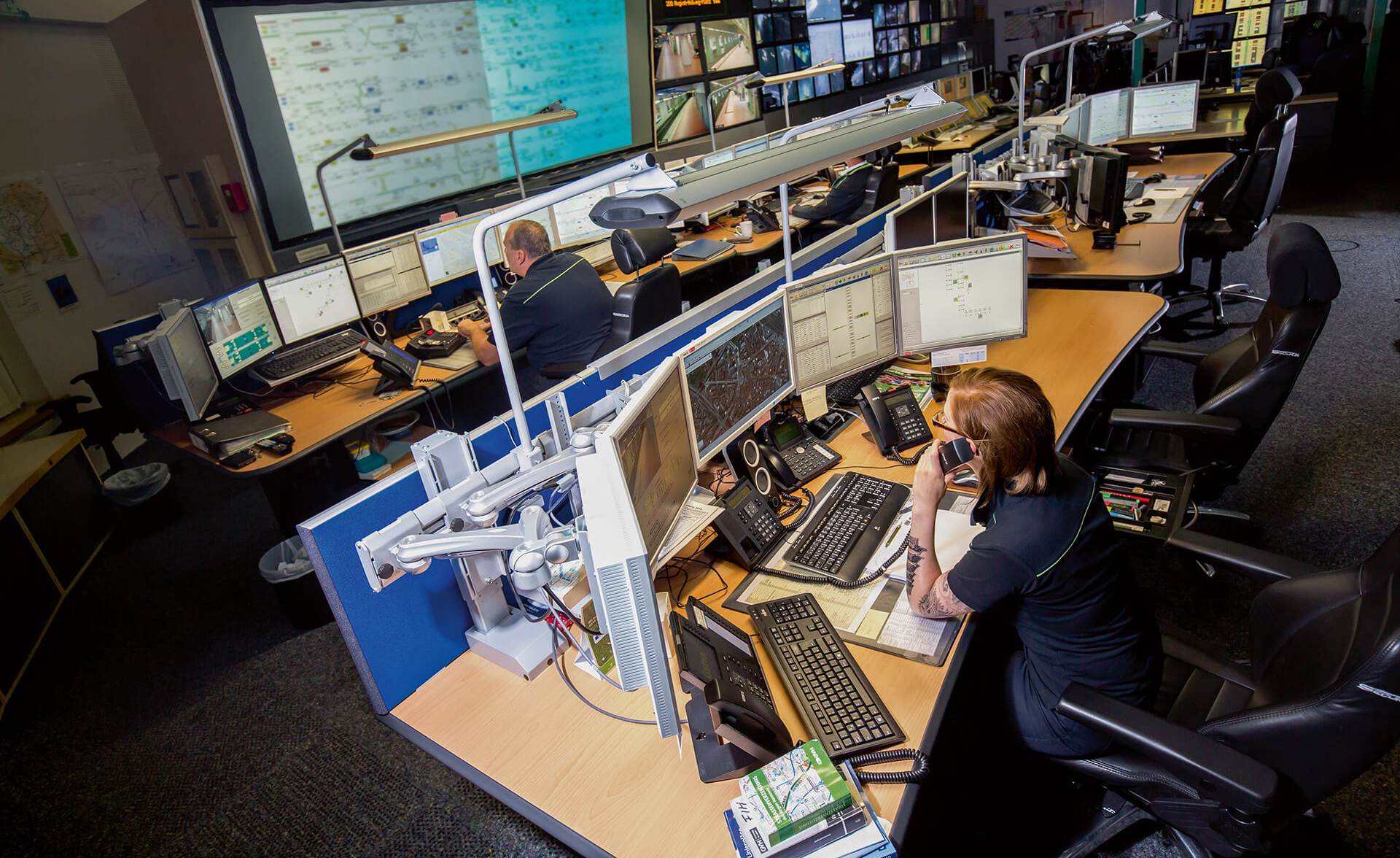
Manage operations
The entire fleet always within reach – with the IVU.suite, dispatch managers control and monitor day-to-day operations on the road. Whether battery, hydrogen, or diesel-powered, the system provides the right function for every type of vehicle. Numerous automations help to react quickly and appropriately in any operating situation.
The IVU.suite continuously monitors all aspects of a trip: from the vehicle status to the timetable situation to the current vehicle and personnel deployment. Dispatch managers therefore always have access to important information such as state of charge, remaining range, and other data relevant to operation. If energy is running out, the IVU.suite warns the dispatch managers and makes suggestions for possible measures. Moreover, the software always takes into account the dispatch-related interventions.
In order to use battery-electric buses as efficiently as possible and extend ranges, the IVU.suite supports the control centre with extensive functions. In particular, by linking operational and CAN bus data, the predicted as well as the actual status can be permanently monitored so that low states of charge do not lead to problems. This enables higher ranges, reduced vehicle deployment, and battery-saving trips. The clear user interface of the IVU.suite not only displays the state of charge, but also monitors the actual and predicted state of charge.
Our solutions at a glance
Whether diesel bus or electric bus – the IVU.suite displays all information essential for dispatching in a single interface. Dispatch managers thus have an overview of the entire fleet at all times.
Always accessible: the current state of charge of each vehicle. In both the map and the table display, dynamic icons signal when action is required.
The IVU.suite automatically determines the remaining range and calculates how many trips are still possible in the currently planned vehicle working, depending on the time, passenger load, or weather.
Connected via CAN bus, the on-board computers of the IVU.box family receive all relevant data on the battery and state of charge directly from the vehicle – without installing additional hardware.
The IVU.suite records all operational events during a vehicle working, such as traffic conditions or the development of the battery status, and uses them to automatically create vehicle-specific forecast models.
The solutions from the IVU.suite process passenger number data from your vehicles for the control centre and passenger information – completely in real time. This allows customers to be informed in advance about a vehicle's passenger load.
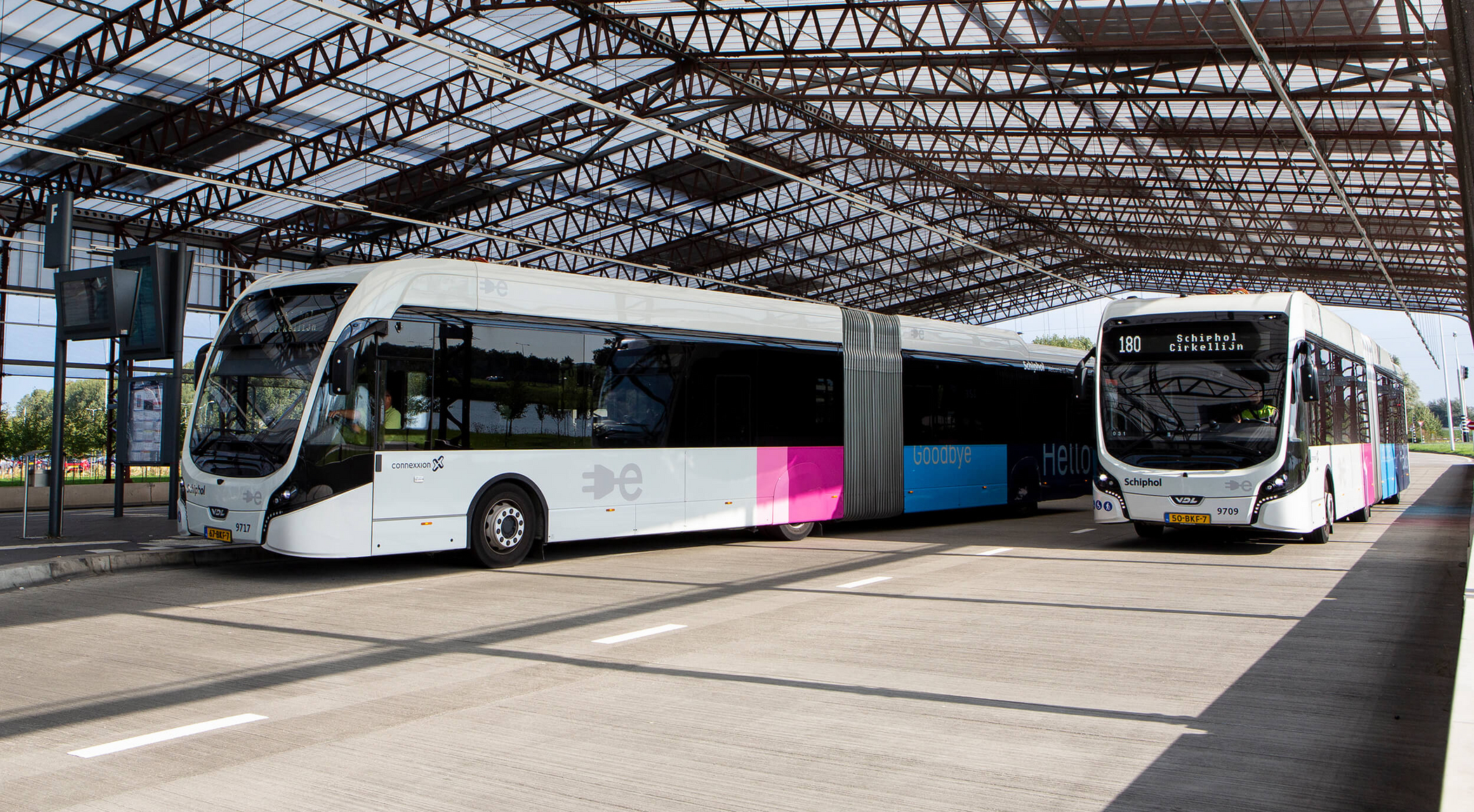
Collect and evaluate data
From link topography to battery profile to consumption atlas: The IVU.suite collects all relevant planned and actual data, merges them and prepares them for further processing. This provides transport companies with all the information they need to analyse the use of electric buses and thus further improve their services.
Uphill and downhill slopes, battery condition, vehicle type, time of day, traffic situation, passenger load, state of charge, vehicle working schedules, outside temperature, weather, vehicle weight – every detail is relevant to making the best use of electric vehicles. Sophisticated Big Data technologies facilitate the handling of this information and allow targeted analyses to exploit all potential.
This is supported by the intelligent algorithms of the IVU.suite: Machine learning makes it possible to generate accurate range forecasts depending on vehicle type, link, day of the week or time of year – the more data available, the more accurate the forecast. This ensures efficiency and saves costs – in the deployment of the electric buses as well as in the planning of the infrastructure.
Key Features
-
Big Data: link topography, vehicle type, weather conditions: A sophisticated data management concept processes all relevant details.
-
Machine Learning: Intelligent algorithms learn as the go: Each vehicle working generates new data that improves the calculation of prognoses.
-
Targeted analyses: Which links are suitable for electric buses? When does energy consumption increase? Comprehensive evaluations provide answers.
-
Plan carefully: Always have enough energy for the next vehicle working: The IVU.suite automatically takes analyses into account in planning.
-
Create reports: Tabular and graphical evaluations for planning and management enable informed decisions.
We look forward to hearing from you
Do you want to talk with a customer advisor or learn more about career opportunities with us? Or maybe there is something else you want to talk to us about? Write to us – your contact person will get back in touch with you as quickly as possible.
IVU Traffic Technologies AG
Headquarters
Bundesallee 88
12161 Berlin, Germany
Phone: +49.30.8 59 06 -0
E-mail: contact@ivu.com
Stay informed – get the latest news about our projects, customers and products directly into your inbox.

